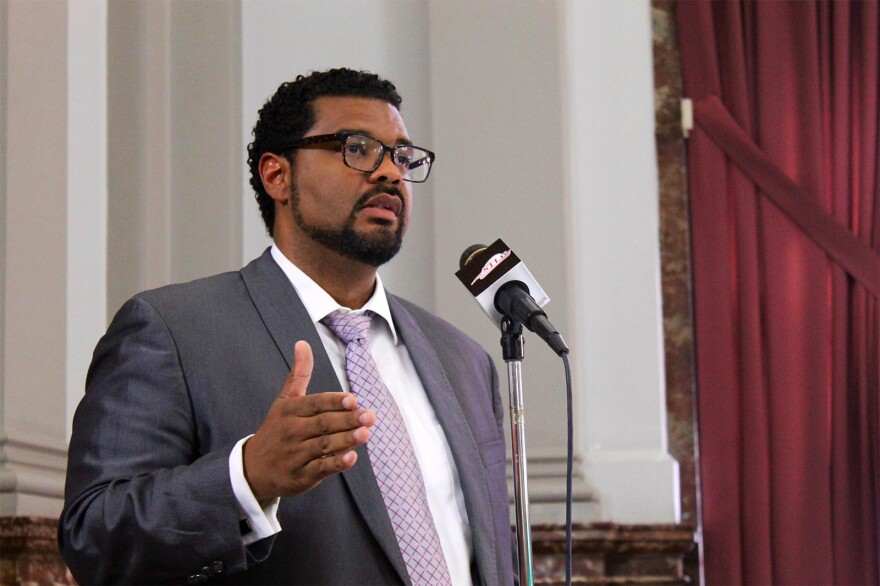The melee to get closer to becoming St. Louis mayor is mere hours away from its conclusion.
The race has featured an endless amount of twists, turns and surprises. And the contest turned a spotlight on the seven Democratic candidates, who attended an array of forums, conducted scores of media interviews and blanketed St. Louis residents with glossy mailers.
Related: Read and listen to all of St. Louis Public Radio's 2017 St. Louis election coverage
By Tuesday night, it should be clear who pushed through the crowded Democratic field and who got the GOP nod to succeed St. Louis Mayor Francis Slay. But with such a large cast of characters, it wouldn’t be surprising if the winner charts a different electoral path than Slay, whose fourth term victory was due to large margins in south St. Louis and the central corridor.
Without further adieu, here are five big questions that could affect Tuesday’s primary:
Will south St. Louis embrace Lyda Krewson?

Surprisingly, this is the first mayoral contest in 20 years that does not feature a candidate from the southwest part of the city. That matters because the area that contains parts of the 10th, 12th, 14th, 16th, 23rd and 24th Wards tend to have the highest voter turnout in municipal elections.
Krewson will likely carry these wards, considering the 28th Ward alderman scooped up most of the area’s key endorsements — including Slay and St. Louis Collector of Revenue Gregory F.X. Daly. Plus, overwhelmingly white parts of the city (like southwest St. Louis) tends to vote for white candidates like Krewson: Slay ended winning deep South Side wards in 2013 by huge margins.
But there’s reason for pause: Unlike Slay, Krewson is from the central corridor and doesn’t have his family ties to south St. Louis. That area’s political dynamics may be changing, too, with most choosing progressive Vermont U.S. Sen. Bernie Sanders over former Secretary of State Hillary Clinton in last year’s Democratic presidential primary. That could provide an opening to someone like city Treasurer Tishaura Jones, who nabbed support from many Sanders-backing activists.
Can African-Americans boost turnout from 2013?

One of the storylines is whether the four major African-American candidates will split the vote, thus handing the election to Krewson. But a bigger question could be whether wards with large black populations turn out in large numbers.
Back in the 2013 mayoral primary, St. Louis Board of Aldermen President Lewis Reed swept most of north St. Louis without trouble. But turnout percentages there were lower than south St. Louis or central corridor wards, which likely contributed to Reed’s defeat.
Alderman Antonio French said that if a similar scenario occurs in 2017, then “it’s very unlikely the city will see another African-American mayor for many years.”
Does money matter?

Slay raised and spent far more money than Reed in 2013, which was likely another reason he came out on top. He used that cold hard cash to pay for television and radio commercials, paid canvassers and those ever-ubiquitous mailers.
This time around, Krewson has been the clear frontrunner when it comes to pulling in and spending campaign donations. But Reed, who the most recent campaign finance reports show had the most money left in the bank, and Jones have also spent serious amounts of money. And French’s lackluster funding could be countered by his vast social media presence.
And of course, there are a number of recent examples where a St. Louis-based candidate won despite being outspent — including Jones, who beat out three other Democratic candidates in 2012 to capture the treasurer’s office.
Which endorsements carry the most weight?

Traditionally, political endorsements do make a difference. But as November’s presidential election showed, it’s not absolute.
Prominent groups and political figures are effectively split between Krewson, Reed, Jones and French. Krewson received backing from Slay and Daly, who both have political pull in south St. Louis. U.S. Rep. Lacy Clay endorsed Reed, who thus may benefit from the University City Democrat’s stout political organization.
Jones received support from former Secretary of State Jason Kander, a rising star among national Democrats. And former Circuit Attorney Jennifer Joyce is backing French, who also has the support of the St. Louis Post-Dispatch editorial page.
Will Republicans vote for ... Republicans?

St. Louis is a heavily Democratic city. But while there aren’t enough Republicans to, say, elect a citywide official, there are enough to make a difference in a close mayoral contest.
Here’s why: Missouri is an open-primary state, which means that Republicans can vote in contested Democratic races. And that often happens in southwest St. Louis, where thousands voted for Trump.
But three Republicans are running for the mayoral nomination, including business executive Andrew Jones and Crown Candy Kitchen owner Andy Karandzieff. And the Democratic candidates haven’t exactly fallen over themselves to be attract Republican voters: Krewson has often taken more left-of-center political positions on gun control and barring smoking in public places, and the other candidates accentuated their Democratic credentials.
In race where a thousand votes or so may make the difference, Republicans, of all voters, may be the bloc that helps decide who sits in Room 200.
On the Trail, a weekly column, weaves together some of the intriguing threads from the world of Missouri politics.
Follow Jason on Twitter:@jrosenbaum






